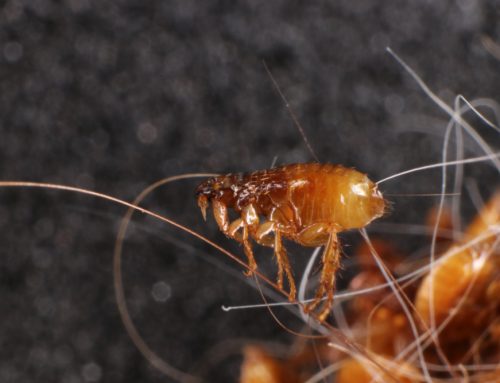As the seasons change, so do our allergies. Many people suffer from seasonal allergies—from runny noses, to sneezing and watery eyes. Likewise, our cats and dogs can develop several allergies, which usually require allergy testing to pinpoint. Pet allergies, however, do have some “usual suspects,” and our Neighborhood Veterinary Centers team has compiled the top 12 allergy causes in our four-legged friends.
1: Flea allergies in pets
Sensitive cats and dogs are often allergic to the proteins in flea saliva. A single flea bite can trigger an allergic reaction and cause severe itching, scratching, and discomfort. Flea allergies are the most common allergy form in pets, but they can be eliminated with parasite preventives and home flea control.
2: Pollen allergies in pets
Like people, pets can be allergic to pollen from the grasses, trees, and weeds that are most prevalent in the spring and fall. Pollen allergies usually manifest as skin irritation and respiratory issues, such as wheezing, coughing, and sneezing.
3: Mold allergies in pets
Mold spores in the air or on damp surfaces can trigger allergic reactions in pets, causing sneezing, coughing, and itchiness. Some molds can damage not only your pet but also your own health. Mold in the home will need professional removal.
4: Dust mite allergies in pets
Dust mites are microscopic creatures that thrive in household dust and can trigger allergic reactions in pets, particularly those with sensitivities to dust mite proteins. These allergies can be managed by vacuuming often, laundering bedding and pet beds weekly, and using air purifiers with HEPA filters throughout the home.
5: Pet food allergies
Some pets can develop food allergies to certain ingredients such as beef, chicken, dairy, and grains. Common food allergy signs include digestive upset, skin irritation, and ear infections. Determining the specific ingredient that causes your pet’s allergic reaction requires changing to a specially formulated hypoallergenic or limited-ingredient diet. If your pet’s allergic reaction goes away, our veterinary team can add back ingredients from the previous diet one at a time to determine the specific culprit.
6: Pet allergies from insect bites
Insect bites from mosquitoes, ants, bees, and wasps can cause allergic reactions in pets that can lead to swelling, itching, and in severe cases, anaphylaxis. This is an emergency and your pet needs immediate treatment.
7: Medication allergies in pets
Cats and dogs can have allergic responses, ranging from mild to severe, to certain medications, including antibiotics, flea preventives, and pain relievers. Monitor your pet closely for any problems after they start a new medication or are vaccinated.
8: Cleaning products that cause pet allergies
Harsh chemicals in many cleaning products, such as bleach and ammonia, can lead to allergic reactions that manifest as skin and respiratory irritations. To avoid complications, put your pet in a separate home area while you are cleaning and keep them there until the solution has dissipated.
9: Fabric allergies in pets
Certain fabrics, materials, or dyes used in bedding, blankets, and clothing can instigate an allergic reaction in pets, usually in the form of skin irritation, rashes, and itching.
10: Pet allergies to certain plants
Many common household plants, such as lilies, tulips, and daffodils, can be toxic to pets and may cause allergic reactions if ingested or if the sap comes into contact with their skin. Always use pet-friendly plant varieties in your home to avoid poison ingestion and allergic reactions.
#11: Smoke- and fume-induced pet allergies
Smoke vapors, from tobacco, e-cigarettes, fires, and candles, can irritate pets’ respiratory systems and trigger allergic reactions. If you smoke, consider doing so outdoors. Keep your pet in another room if they are sensitive to fireplace smoke, candles, incense, or essential oils, which can be toxic.
12: Chemical allergies in pets

Chemicals in household products, such as air fresheners, pesticides, and paints, can cause allergic reactions in pets, which may lead to sneezing, coughing, and skin irritation. Many also are toxic to pets, if ingested, and should be kept out of your pet’s reach.
Be aware of, and avoid, these common allergens to create a healthy home environment for your pet. If you suspect your pet suffers from allergies or is having an allergic reaction, contact our Neighborhood Veterinary Centers team immediately for diagnosis and treatment options.






Leave A Comment